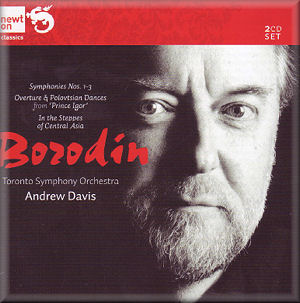 |
 |
|


alternatively
CD:
MDT
AmazonUK
AmazonUS
|
Alexander BORODIN (1833 - 1887)
Symphony No. 1 (1862-67) [34:42]
Symphony No. 2 (1869-76) [26:23]
Symphony No. 3 (1882) [17:43]
String Quartet No. 2 in D - Notturno [8:41]
In the Steppes of Central Asia (1880) [7:23]
Prince Igor (1869-87): Overture [10:32]; Polovtsian
Dances [12:58]
 Toronto Symphony Orchestra/Andrew Davis; New York Philharmonic Orchestra/Leonard Bernstein (Asia); St Petersburg Camerata (Notturno)
Toronto Symphony Orchestra/Andrew Davis; New York Philharmonic Orchestra/Leonard Bernstein (Asia); St Petersburg Camerata (Notturno)
rec. Massey Hall, Toronto, 1976 (Davis); Philharmonic Hall, New York, December 1969 (Bernstein); Radio House, St Petersburg, June 1993 (Notturno) ADD, DDD (only Notturno)
 NEWTON CLASSICS 8802097 [77:34 + 57:17]
NEWTON CLASSICS 8802097 [77:34 + 57:17]
|
|
|
Borodin was only a part-time composer - he was a full-time professor
of chemistry - and his original orchestral works fit easily
onto this pair of discs. Indeed when he died his music was in
such disarray that it required a considerable amount of editorial
work by Glazunov and Rimsky-Korsakov to put it into a performable
state.
Of the works the composer did manage to complete, the First
Symphony is frankly an experimental work which does not
always ‘come off’; and the Third Symphony is a torso
left incomplete at his death which Glazunov had to reconstruct.
The resulting pair of movements sound like intermezzi, and one
feels that the work needs more substantial movements to be a
really satisfactory whole.
The real masterwork which Borodin left, however, is undoubtedly
the Second Symphony: one of the greatest Russian symphonies
of the nineteenth century and worthy to be ranked with the last
three of Tchaikovsky. In particular the slow movement is a beautiful
piece which looks forward to Rachmaninov, especially in the
return of the main theme on massed strings. But the symphony
presents major problems for performers, and one of these comes
with the initial statement of this main theme on solo horn.
This opens with a single detached note which if not very tactfully
handled can easily sound like a false entry. There is a particularly
awful example in the recording by the USSR State Symphony Orchestra
under Svetlanov,
and Carlos Kleiber in Stuttgart is nearly as bad. It needs to
be carefully integrated with the opening phrase. Davis’s Toronto
player here totally ignores the detached note and blends it
into the melody, which is not what Borodin wrote, and his playing
thereafter is sometimes inelegant.
The main problem with the Davis performances, which constitute
the greater part of the contents of this two-disc set, is the
recorded balance. When the recordings were issued in the late
1970s - the disc cover states that the recording date for the
symphonies is unknown, but it was 1976 - the set came into competition
with contemporaneous recordings under Tjeknavorian,
and it has to be admitted that despite the controversially wayward
interpretations of the Armenian conductor listening to the recordings
again confirms their superiority. The balance in Toronto is
horribly forward and exposes the slightest defect in the orchestral
playing, which is not impeccable. In the Polovtsian Dances
there is an unnamed and un-credited chorus employed, but the
very forward balance they are given cannot disguise their woeful
inadequacy in numbers; the tenors sound horribly strained.
Davis for some reason never recorded In the steppes of Central
Asia as part of his otherwise complete survey of Borodin’s
orchestral music, and a 1969 performance by Bernstein is therefore
interpolated. Sadly, the recorded balance here is, if anything,
even worse. The idea behind the music is straightforward enough;
the travelling caravan should advance towards the listener and
then retreat into the distance. Here the woodwind and high violins
at the beginning are already right in the listener’s face, and
then as the music grows louder the orchestra paradoxically enough
recedes into the middle distance – only for the process to be
reversed at the end. There is therefore no light and shade,
no sense of progress. To add insult to injury, the melody in
the winds at the climax is all but drowned out by the overly
forward balance given to the strings and brass. This is most
certainly not one of Bernstein’s great recordings, although
he paces the music well.
The most interesting item in this collection is one of the shortest
tracks - and the only digital recording - an orchestration of
the Nocturne third movement of the Second String
Quartet. There is no indication of who was responsible
for the orchestral arrangement. David Gutman - who contributes
a new and commendably informative set of notes - seems unsure.
He refers to the arrangements by Sargent for strings and Rimsky-Korsakov
for violin solo and small orchestra - it is clearly neither
of these - and also to an arrangement by Nicholas Tcherepnin
which this appears to be. Järvi includes this arrangement in
his Borodin collection; and it is very effective. It clearly
expects a large romantic orchestra with plenty of romantic violin
‘wash’, and this is not what it receives here from the St Petersburg
Camerata, who appear to have no more than two desks of strings
in any section. One other minor point: the muted horn solo towards
the end is played with what sounds like hand-stopping, and the
resulting brassy rasp sticks out unpleasantly like a sore thumb.
The performance otherwise is very good and nicely inflected,
although no conductor is credited at all.
This one track of interest is not sufficient to commend this
reissue. There any many other recordings of these works, and
many better ones at that.
Paul Corfield Godfrey
See also review by Rob
Barnett
|
|












